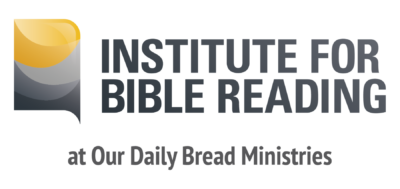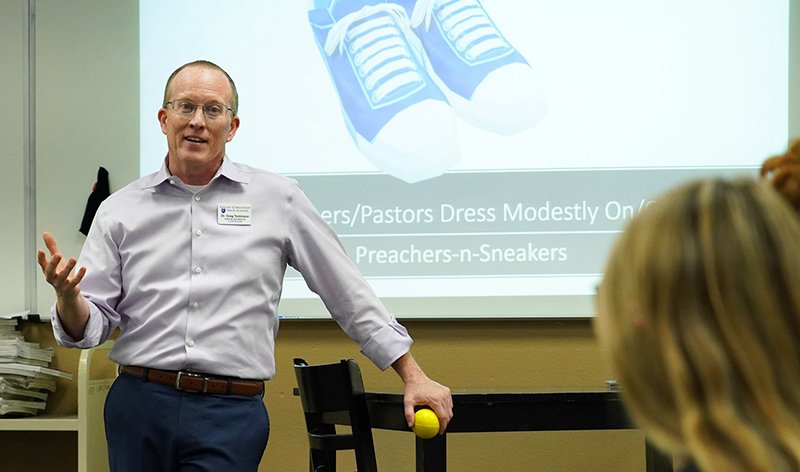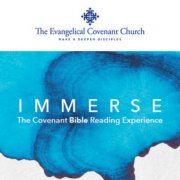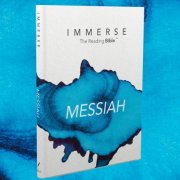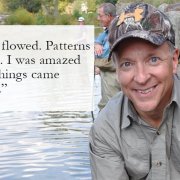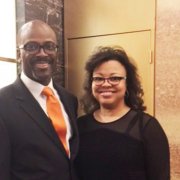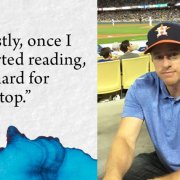From Heartbroken to Hopeful: Immerse at Valley Christian High School
Dr. Greg Tonkinson is immersed in a Gen Z world. In addition to having four teenagers at home, for the last thirteen years Greg has been the Spiritual Formation Director and Chair of the Bible Department at Valley Christian School in Phoenix, AZ. (VCS is rated one of the Top 50 Christian Schools in the country and ranked by USA Today as one of the top 12 sports schools in the country.)
In 2019, heartbroken and frustrated with their student’s alarming withdrawal from the Bible, Greg instituted a radical shift at Valley Christian, restructuring their Bible curriculum around Immerse: The Bible Reading Experience. What they experienced went far beyond anything he could have imagined.
I sat down with Greg to talk about the paradigm shift at Valley Christian.
Greg, I’d like to start with your story. How did you get hooked on the Bible?
I came to Christ as a freshman at Arizona State University thru Cru (formerly Campus Crusade). Ironically ASU was ranked one of the top party schools in the nation, but that’s where I came to faith.
Fortunately, my mentors as well as my fellow students were ardent Bible readers, so I kind of picked it up by osmosis. Because I had no real experience in Christianity or the church, I assumed this kind of deep Bible engagement was normal. I went on to earn a couple of Bible degrees and ended up teaching Bible at Valley Christian. It didn’t take long to realize I’d been living in kind of a Bible bubble and that my students, most of who grew up in church, had zero viable connection to the Bible.
As someone who spends a good chunk of your waking hours with high school students, what’s your perspective on this generation of young people?
My heart truly goes out to Gen Z kids and their parents. In prior generations, parents could look their kids in the eye and say, “I know what you’re going through,” but this is no longer the case. These kids have been swept into a technological revolution unlike anything we’ve seen before. And while there are some advantages, the drawbacks are dauntingly scary.
These kids are facing earth-shaking questions that weren’t even on the radar in my generation: global warming, terrorism, pandemics. Almost weekly I have students coming up to me asking real life questions about a friend or a sibling struggling with sexual identity.
We took Gen Z, put them on an island with all these variables, and told them to figure it out.
We took Gen Z, put them on an island with all these variables, and told them to figure it out.
In an earlier conversation, you told me Bible illiteracy among high school students is “catastrophic.” Can you elaborate on that?
When I started teaching Bible thirteen years ago, I started with a baseline of assumptions about where kids were at with the Bible when they started high school. In ten short years those assumptions have thoroughly eroded. They may own Bibles but for many of them their only real experience with the Bible are a few isolated Bible verses they see on the screen at church.
A decade ago they showed up bored with the Bible, but now they come to my classes questioning the validity of the Scriptures. They don’t even have a rudimentary knowledge of the Bible. They don’t know the key players.
I’m careful about my choice of words, so I don’t use the word catastrophic lightly. There’s absolutely no sense of marrying their faith decisions with a way to grow in their faith.
Tell me about your introduction to Immerse and your decision to make it the core of your curriculum.
I was at a point where this was affecting me personally. I was heart-broken over the condition of my students. There were sleepless nights. And by this time, I was also struggling with the thought that our pedagogy might be part of the problem.
We were doing a good job on systematic theology, world religions, contemporary moral issues. But there was a gaping hole. I couldn’t say with an ounce of integrity that our students were reading the Bible. We wished it and hoped it, but it wasn’t in our lesson plans.
Then in 2019, I attended Christian School International’s Symposium of the Bible at the Bible Museum in Washington D.C. You were there, Paul, and you introduced us to Immerse: The Bible Reading Experience.
I’m a skeptic by nature. I’ve been jaded by so many publishers peddling their wares, so I’m leery of easy answer solutions.
But the longer I listened to the Immerse rationale, the more I was drawn in. I heard a fellow teacher described the remarkable impact Immerse had had with his students.
I went home burdened with the idea that I was facing a crucial decision. It was like when I came to faith; I prayed and said to God, “Give me a reason not to do this, not to go in this direction.” It was a God moment; everything just clicked. My frustrations, my tensions, my heartbreak for these students; I began to feel hope that this fresh approach to the Bible might actually work.
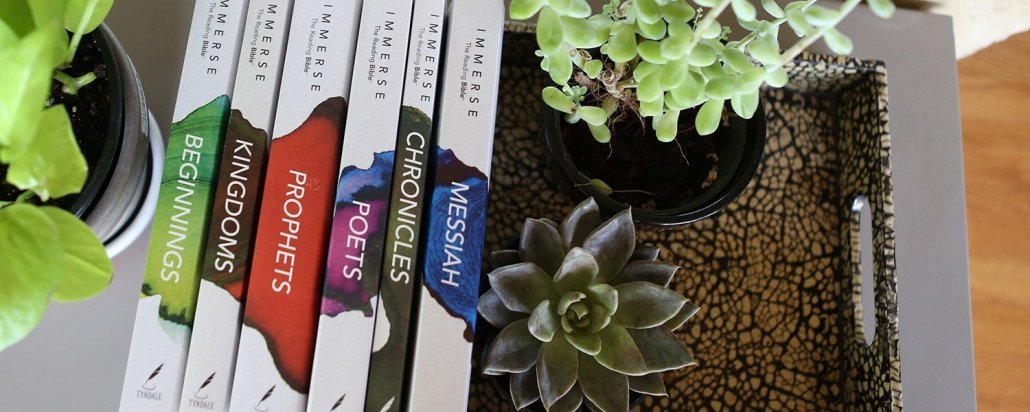
Immerse is a paradigm shift. What adjustments did you have to make?
The adjustment to the Immerse Bible was seamless. Reading a Bible without chapters and verses and books in a different order—the kids didn’t bat an eyelash. It looks and reads like any other book they’ve ever read!
Because Immerse is designed around a more horizontal learning experience – more like a book club than a Bible study – I had to deconstruct the idea that I have the knowledge and you need to listen to me. Today I’m more of “the guide on the side than the sage from the stage.” I’ve had to step aside and honestly it’s been fantastic!
Three year later, Valley Christian students are immersed in Immerse. What impact is it having?
For starters, the kids are now reading 30 to 40 pages a week from Immerse. We’ve pivoted from just learning about the Bible to reading the Bible itself.
Coming from a place of feeling hopeless, I was so moved seeing groups of kids reading together in the classroom or in the courtyard, with their Immerse Bibles open, having engaging conversations. It brought tears to my eyes.
There was also a more subtle shift. In the past, the kids treated Bible classes like algebra or history or any other class. It was all about getting a good grade. As I watched the transformation unfold, it dawned on me that the kids weren’t just reading for a grade. They were reading to discover.
The kids weren’t just reading for a grade. They were reading to discover.
The deep reading has led to a massive shift in our conversations. We give the kids 5 open-ended questions and it’s been astonishing – so much more vigorous than when I was just lecturing. Students are the ones generating and owning the questions.
Occasionally I’m asked if this approach isn’t a breeding ground for heresy. I’d say the opposite is true. We’re learning that when we give students the freedom to ask hard questions, it doesn’t repel them; it draws them back in. It doesn’t make them question their faith. It’s only people who are cherry picking the Bible who think the Bible isn’t complex. Their faith today is more sincere and authentic.
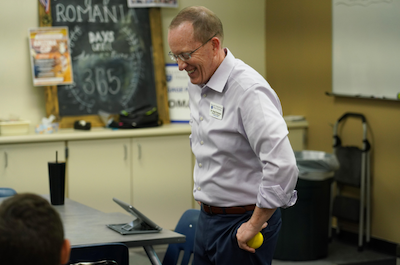
When God meets them through his word, it’s electrifying.
Any stories you want to share?
Each week the kids have to send me a report on their discoveries and the questions they’re wrestling with. So I’m tuned in to what these kids are thinking like never before.
I recently received a report from one of my “quiet students,” someone who never spoke up in class. We’d been reading about the endless cycle of Israel’s corrupt kings. He asked: Isn’t there a better way for God to do this? I know that God took care of the ultimate problem of sin on the cross, but it seems like it took him awhile to get there. Some might view that as sacrilegious or blasphemy. I disagree. This is what authentic theology looks like! This is how we turn students into theologians.
Recently I had a moment of profound joy. We’d just finished reading Immerse: Prophets, about 450 pages, and we were basking in the glow of that. I said to the class, “You read every major and minor prophet in 16 weeks!” I’m standing there tearing up and they’re wondering why I’m getting so emotional about this. But I know that my students are experiencing something that most of their parents have never experienced, and it gives me hope for this generation.
Will you share some final thoughts?
We’re fighting against this horrific trend of young people walking away from the faith. Before our Immerse experiment, I didn’t have any hope we could reverse that trend. But now I have a front row seat watching these kids engrossed in their Bibles.
In the last decade we’ve created Bible apps to make the Bible more convenient, but that’s not enough. We need an altogether new approach to the Bible, which is why I absolutely adore telling people about Immerse. It’s complex but simple. It’s profound but presented in a way that it’s approachable. It’s appealing, dare I say entertaining, and fun! It’s what the title says, it’s immersive.
Seeing my kids excited about God’s word and experiencing God – there’s nothing like it!
